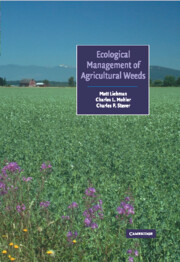Book contents
- Frontmatter
- Contents
- Preface
- 1 Weed management: a need for ecological approaches
- 2 Weed life history: identifying vulnerabilities
- 3 Knowledge, science, and practice in ecological weed management: farmer–extensionist–scientist interactions
- 4 Mechanical management of weeds
- 5 Weeds and the soil environment
- 6 Enhancing the competitive ability of crops
- 7 Crop diversification for weed management
- 8 Managing weeds with insects and pathogens
- 9 Livestock grazing for weed management
- 10 Weed evolution and community structure
- 11 Weed management: the broader context
- Taxonomic index
- Subject index
3 - Knowledge, science, and practice in ecological weed management: farmer–extensionist–scientist interactions
Published online by Cambridge University Press: 10 November 2009
- Frontmatter
- Contents
- Preface
- 1 Weed management: a need for ecological approaches
- 2 Weed life history: identifying vulnerabilities
- 3 Knowledge, science, and practice in ecological weed management: farmer–extensionist–scientist interactions
- 4 Mechanical management of weeds
- 5 Weeds and the soil environment
- 6 Enhancing the competitive ability of crops
- 7 Crop diversification for weed management
- 8 Managing weeds with insects and pathogens
- 9 Livestock grazing for weed management
- 10 Weed evolution and community structure
- 11 Weed management: the broader context
- Taxonomic index
- Subject index
Summary
Introduction
Weed scientists usually cite pervasive crop yield losses due to weeds and substantial direct and indirect costs of weed control to justify research and extension budgets (see Chapter 1). Reductions in costs and yield losses should also be used to evaluate the progress of scientists in solving weed problems. Ultimately weed costs to agriculture are determined by how farmers and ranchers manage weeds, not by papers published or field days organized. In temperate and tropical regions, field crop farmers who use mechanization, cattle ranchers, dairy farmers, vegetable and fruit growers, and smallholders on hillsides all devote time and resources to weed management. What is the role of research and extension in enabling this wide diversity of farmers to manage their weeds better?
This chapter examines the implications of farmer–extensionist–scientist interactions for the development of improved weed management. The first sections review historically how humans have learned to manage weeds. The chapter then analyzes scientist, extensionist, and farmer perspectives on weeds. The final sections describe how farmers, extensionists, and scientists can collaborate to develop field- and farm-level weed management strategies better adapted to weed patchiness and uncertainty. Case studies from the USA and Central America illustrate possible working relations among scientists, extensionists, and farmers.
- Type
- Chapter
- Information
- Ecological Management of Agricultural Weeds , pp. 99 - 138Publisher: Cambridge University PressPrint publication year: 2001
- 4
- Cited by



